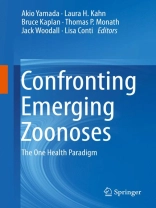This book provides readers with information on the factors underlying the emergence of infectious diseases originating in animals and spreading to people. The One Health concept recognizes the important links between human, animal, and environmental health and provides an important strategy in epidemic mitigation and prevention. The essential premise of the One Health concept is to break down the silos among the different health professions and promote transdisciplinary collaborations. These concepts are illustrated with in-depth analyses of specific zoonotic agents and with examples of the successes and challenges associated with implementing One Health. The book also highlights some of the challenges societies face in confronting several specific zoonotic diseases. A chapter is included on comparative medicine to demonstrate the broad scope of the One Health concept. Edited by a team including the One Health Initiative pro bono members, the book is dedicated to those studying zoonotic diseases and comparative medicine in both human and veterinary medicine, to those involved in the prevention and control of zoonotic infections and to those in the general public interested in the visionary field of One Health.
Inhaltsverzeichnis
Part I The Importance of a One Health Approach to Emerging Zoonotic Diseases.- 1 The Origin of Human Pathogens.- 2 Drivers of Emerging Zoonotic Infectious Diseases.- 3 Biodiversity and Emerging Zoonoses.- Part II Understanding Zoonotic Diseases Through A One Health Perspective.- 4 Hantaviruses.- 5 Enterohemorrhagic E. Coli Infections.- 6 Bartonellosis: A One Health Perspective.- 7 A One Health Approach to Influenza Pandemics.- Part III The Successes and Challenges of Implementing One Health.- 8 One Health: From Concept to Practice.- 9 Field Epidemiology and One Health: Thailand’s Experience.- 10 One Health and Food Safety.- 11 The Clinical Biomedical Research Advances Achievable Utilizing One Health Principles.- 12 One Health Successes and Challenges.












